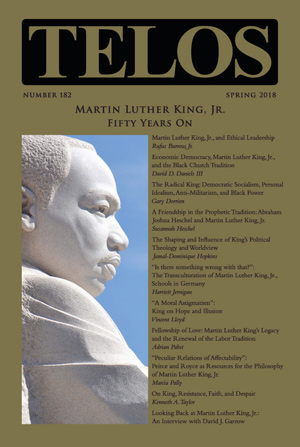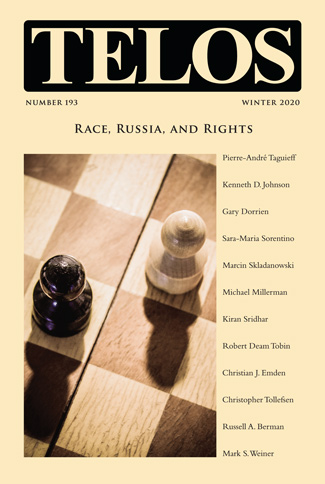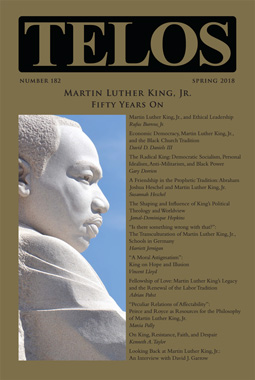By Telos Press · Monday, January 18, 2021 Save 30% on Telos 182 (Spring 2018): Martin Luther King, Jr.: Fifty Years On, a special issue dedicated to King’s life and thought, in our store. Offer expires 1/24/21.
 In commemoration of the life and legacy of Martin Luther King, Jr., today’s episode of the Telos Press Podcast features a wide-ranging interview with Kenneth D. Johnson by Telos editor David Pan. Their discussion covers a variety of topics, including the influence of King on the Black Lives Matter movement, the different approaches to political activism and civil disobedience, the call to defund the police, the nature and effects of systemic racism, the role of education in expanding opportunities for the Black community, the role of government in addressing social and economic inequalities, and the question of how a universal basic income might help alleviate these problems. In commemoration of the life and legacy of Martin Luther King, Jr., today’s episode of the Telos Press Podcast features a wide-ranging interview with Kenneth D. Johnson by Telos editor David Pan. Their discussion covers a variety of topics, including the influence of King on the Black Lives Matter movement, the different approaches to political activism and civil disobedience, the call to defund the police, the nature and effects of systemic racism, the role of education in expanding opportunities for the Black community, the role of government in addressing social and economic inequalities, and the question of how a universal basic income might help alleviate these problems.
In addition to being a member of Telos‘s editorial board, Ken Johnson edited Telos 182 (Spring 2018): Martin Luther King, Jr.: Fifty Years On, a special issue dedicated to King’s life and thought. We are now offering a 30% discount on Telos 182 when you purchase your copy in our store. With ten in-depth articles on King’s intellectual and political legacy, as well as an interview with King scholar David Garrow, Telos 182 is a must-read for anyone interested in understanding how Martin Luther King Jr. continues to influence us today. Read the introduction to Telos 182 here.
Listen to the podcast here.
Continue reading →
By David Pan · Friday, December 18, 2020 Telos 193 (Winter 2020): Race, Russia, and Rights is now available for purchase in our store. Individual subscriptions to Telos are also available in both print and online formats.
 What is not up for discussion? The answer to this question defines a political order, and the repressiveness of such an order will depend on where this boundary is set between the discussable and the undiscussable. But it is not as if more discussion necessarily means less repression. Certain topics—genocide, torture, slavery—definitely need to be off the table as legitimate political measures. Other topics—the choosing of rulers and historical facts—need to be discussable in order to avoid tyranny. In between lies a gray area whose definition will establish the character of each political order. Conversely, a lack of consensus on this issue will lead to political instability that goes beyond the content of political debates, indicating that the question of discussability coincides with the problem of political identity. This issue of Telos will consider three areas in which discussability has become the main issue, leading to implacable conflict. What is not up for discussion? The answer to this question defines a political order, and the repressiveness of such an order will depend on where this boundary is set between the discussable and the undiscussable. But it is not as if more discussion necessarily means less repression. Certain topics—genocide, torture, slavery—definitely need to be off the table as legitimate political measures. Other topics—the choosing of rulers and historical facts—need to be discussable in order to avoid tyranny. In between lies a gray area whose definition will establish the character of each political order. Conversely, a lack of consensus on this issue will lead to political instability that goes beyond the content of political debates, indicating that the question of discussability coincides with the problem of political identity. This issue of Telos will consider three areas in which discussability has become the main issue, leading to implacable conflict.
Continue reading →
By Kenneth A. Taylor · Monday, May 14, 2018 Kenneth A. Taylor’s “On King, Resistance, Faith, and Despair” appears in Telos 182 (Spring 2018), a special issue commemorating the life and thought of Martin Luther King, Jr. Read the full article at the Telos Online website, or purchase a print copy of the issue in our online store. Individual subscriptions to Telos are now available in both print and online formats.
Martin Luther King, Jr.’s deep and abiding religious faith led him to believe that “the arc of the moral universe is long, but . . . bends toward justice.” Though he believed that God exercises providential guidance over the universe, he did not think that the work of bending the arc of the universe belongs to God alone, with no need for human agency. We humans are urgently called by God to cooperate in the struggle for justice through “vigorous and positive action.” And King knew firsthand how arduous this struggle could be. We toil for justice in a darkened world that creaks and groans under the weight of many and diverse forms of injustice. Heeding the call may cost us much that is dear—including, as it did for King himself, our lives. King was convinced, however, that if our efforts are anchored in faith, we can rest assured that if we do heed the call, we will struggle neither alone nor in vain. The God who calls to us will struggle with us. “Evil dies on the seashore,” says King, “not merely because of man’s endless struggle against it, but because of God’s power to defeat it.” His faith that this is so not only spurred him to action but sustained him in his darkest hours and functioned as a bulwark against a potentially paralyzing despair.
Continue reading →
By Kenneth D. Johnson · Monday, March 19, 2018 Telos 182 (Spring 2018), a special issue commemorating the life and thought of Martin Luther King, Jr., is now available for purchase in our store.
 1968 was a tough year for the United States and for many around the world. The Tet Offensive in Vietnam started in January, and the My Lai massacre occurred there in March. In Paris, the student uprising started in May. The Prague Spring, during which Czechoslovakian activists sought a measure of greater freedom for their country from the Soviet Union, was crushed by Warsaw Pact military forces in August. Police rioted at the Democratic National Convention in Chicago in August, beating student protestors indiscriminately in the streets. The Weather Underground emerged in October, and black American sprinters Tommie Smith and John Carlos gave their gloved Black Power salute as a protest during the Mexico City Olympics that same month. Richard M. Nixon was elected as president in November. And, there were two pivotal deaths: Robert F. Kennedy in June, and Reverend King in April. After King’s assassination, many U.S. cities erupted in flames as their African American residents protested his killing and the moribund state of civil rights progress at the time of King’s death. 1968 was a tough year for the United States and for many around the world. The Tet Offensive in Vietnam started in January, and the My Lai massacre occurred there in March. In Paris, the student uprising started in May. The Prague Spring, during which Czechoslovakian activists sought a measure of greater freedom for their country from the Soviet Union, was crushed by Warsaw Pact military forces in August. Police rioted at the Democratic National Convention in Chicago in August, beating student protestors indiscriminately in the streets. The Weather Underground emerged in October, and black American sprinters Tommie Smith and John Carlos gave their gloved Black Power salute as a protest during the Mexico City Olympics that same month. Richard M. Nixon was elected as president in November. And, there were two pivotal deaths: Robert F. Kennedy in June, and Reverend King in April. After King’s assassination, many U.S. cities erupted in flames as their African American residents protested his killing and the moribund state of civil rights progress at the time of King’s death.
Continue reading →
By Kenneth D. Johnson · Monday, February 8, 2016 Kenneth D. Johnson is affiliated with the William J. Seymour Institute for Black Church and Policy Studies, in Boston. The following paper was presented at the 2016 Telos Conference, held on January 16–17, 2016, in New York City. For news about upcoming conferences and events, please visit the Telos-Paul Piccone Institute website.
Introduction
The spate of killings of unarmed African American males by police and vigilante residents has continued to roil public opinion in the black community, leading to various forms of social protest, in particular by varied groups of young adult African Americans.
Preeminent among these groups is #BlackLivesMatter, which now aspires to become a national movement, sometimes in coalition with other contemporary groups formed near the same time, and displacing older Civil Rights groups and the Black Church’s ethical and protest traditions.
While #BlackLivesMatter has partly instrumentalized Black Church social protest tradition, it has done so in the service of a fundamentally secular set of ethical commitments. In the process, the #BlackLivesMatter movement has discarded the internal resources of self-critique that Black Church ethical praxis provides.
Continue reading →
By Kenneth D. Johnson · Monday, February 9, 2015 The recent protests of the deaths of Michael Brown in Ferguson, Missouri, and Eric Garner in New York City, both black males, at the hands of police, ignited what some believe to be a new movement in the vein of the historic black Civil Rights Movement of the 1960s. Little did Messrs. Brown and Garner know that their tragic deaths would breathe new life into a near-dead progressive Left.
New groupings of Gen Xers and Millennials, networking through the Internet, have now displaced older activist groups led by the Rev. Jesse Jackson and the Rev. Al Sharpton. Other groups, like organized labor (especially SEIU), and perennial malcontents of Marxian legacy, such as the ANSWER coalition and the Revolutionary Communist Party, USA, have appeared in protests, alongside shadowy cadres of white anarchists, who in some cities have thrown firebombs and damaged property during protest actions. Unlike Occupy Wall Street and its derivatives, the new protest groups have an identifiable leadership, appear regularly in news media, and are building the road as they travel, that is, working out tactics and strategies based on their reading (or misreading) of past protest movements, as they go.
Continue reading →
|
|
 In commemoration of the life and legacy of Martin Luther King, Jr., today’s episode of the Telos Press Podcast features a wide-ranging interview with Kenneth D. Johnson by Telos editor David Pan. Their discussion covers a variety of topics, including the influence of King on the Black Lives Matter movement, the different approaches to political activism and civil disobedience, the call to defund the police, the nature and effects of systemic racism, the role of education in expanding opportunities for the Black community, the role of government in addressing social and economic inequalities, and the question of how a universal basic income might help alleviate these problems.
In commemoration of the life and legacy of Martin Luther King, Jr., today’s episode of the Telos Press Podcast features a wide-ranging interview with Kenneth D. Johnson by Telos editor David Pan. Their discussion covers a variety of topics, including the influence of King on the Black Lives Matter movement, the different approaches to political activism and civil disobedience, the call to defund the police, the nature and effects of systemic racism, the role of education in expanding opportunities for the Black community, the role of government in addressing social and economic inequalities, and the question of how a universal basic income might help alleviate these problems. 








